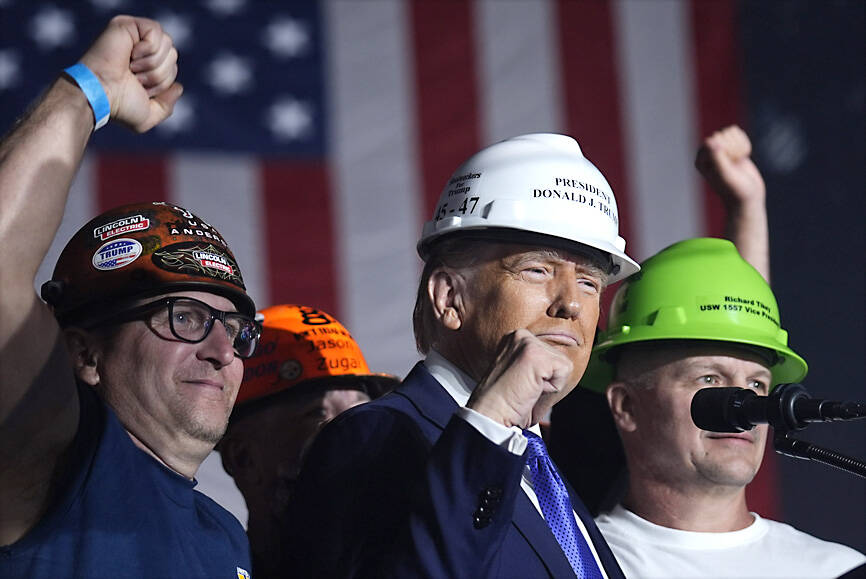US president-elect Donald Trump reiterated his opposition to the sale of United States Steel Corp to Nippon Steel Corp, saying he would instead use tariffs and tax incentives to revive the US steelmaker.
Trump made the comment in a Truth Social post on Monday night, with the decision on whether it goes forward slated to land on US President Joe Biden’s desk before Trump’s inauguration.
Biden opposes it and has said US Steel would remain domestically owned, “guaranteed.” However, the president has stopped short, of flatly pledging to kill the acquisition.

Photo: AP
While the decision is not currently poised to fall to Trump, his ardent opposition is nonetheless another obstacle for an acquisition that became something of a political lightning rod during this year’s campaign.
“I am totally against the once great and powerful US Steel being bought by a foreign company, in this case Nippon Steel of Japan,” he wrote. “Through a series of Tax Incentives and Tariffs, we will make US Steel Strong and Great Again, and it will happen FAST! As President, I will block this deal from happening. Buyer Beware!!!”
Nippon Steel is “determined to protect and grow US Steel in a manner that reinforces American industry, domestic supply-chain resiliency, and US national security,” a company spokesperson said in an e-mailed statement after Trump’s comment.
The deal is under review by the Committee on Foreign Investment in the United States. The panel granted a request for the case to be refiled in September, effectively allowing a delay. The deal must go to Biden this month, unless it is delayed again.
The political stakes are high, in part because US Steel is based in Pennsylvania, a crucial battleground that Biden won in 2020 and Trump took in last month’s election. Trump and Biden also jockeyed for the support of union workers, and the deal is opposed by the United Steelworkers union.

Merida Industry Co (美利達) has seen signs of recovery in the US and European markets this year, as customers are gradually depleting their inventories, the bicycle maker told shareholders yesterday. Given robust growth in new orders at its Taiwanese factory, coupled with its subsidiaries’ improving performance, Merida said it remains confident about the bicycle market’s prospects and expects steady growth in its core business this year. CAUTION ON CHINA However, the company must handle the Chinese market with great caution, as sales of road bikes there have declined significantly, affecting its revenue and profitability, Merida said in a statement, adding that it would

Greek tourism student Katerina quit within a month of starting work at a five-star hotel in Halkidiki, one of the country’s top destinations, because she said conditions were so dire. Beyond the bad pay, the 22-year-old said that her working and living conditions were “miserable and unacceptable.” Millions holiday in Greece every year, but its vital tourism industry is finding it harder and harder to recruit Greeks to look after them. “I was asked to work in any department of the hotel where there was a need, from service to cleaning,” said Katerina, a tourism and marketing student, who would

i Gasoline and diesel prices at fuel stations are this week to rise NT$0.1 per liter, as tensions in the Middle East pushed crude oil prices higher last week, CPC Corp, Taiwan (台灣中油) and Formosa Petrochemical Corp (台塑石化) said yesterday. International crude oil prices last week rose for the third consecutive week due to an escalating conflict between Israel and Iran, as the market is concerned that the situation in the Middle East might affect crude oil supply, CPC and Formosa said in separate statements. Front-month Brent crude oil futures — the international oil benchmark — rose 3.75 percent to settle at US$77.01

RISING: Strong exports, and life insurance companies’ efforts to manage currency risks indicates the NT dollar would eventually pass the 29 level, an expert said The New Taiwan dollar yesterday rallied to its strongest in three years amid inflows to the nation’s stock market and broad-based weakness in the US dollar. Exporter sales of the US currency and a repatriation of funds from local asset managers also played a role, said two traders, who asked not to be identified as they were not authorized to speak publicly. State-owned banks were seen buying the greenback yesterday, but only at a moderate scale, the traders said. The local currency gained 0.77 percent, outperforming almost all of its Asian peers, to close at NT$29.165 per US dollar in Taipei trading yesterday. The